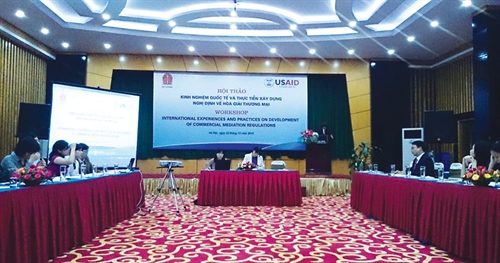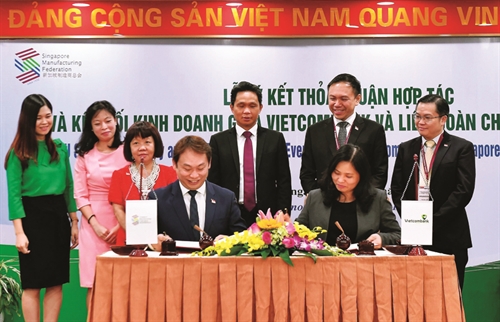Bui Duc Giang
PhD in law[1]
On September 29, 2017, the State Bank of Vietnam enacted Circular 13/2017/TT-NHNN (effective as of November 15, 2017) amending a number of articles of Circular 07/2015/TT-NHNN on bank guarantees (Circular 07). The main changes brought about by the new text relate to guarantees for housing projects and are embedded in Article 12 of Circular 07[2].
 |
| A corner of Barya Citi, a high-end villa project in Ba Ria-Vung Tau province__Photo: Internet |
Incorporation of guarantees for housing projects in the Law on Real Estate Business
Under Article 56 of Law 66/2014/QH13 on Real Estate Business dated November 25, 2014 (the Law on Real Estate Business), before selling or granting hire-purchase of a future house, the project owner/developer (the owner) is obliged to sign a guarantee contract with a commercial bank to secure the reimbursement to the customer of an advanced percentage of the contract price and all other amounts in accordance with the terms of the contract for purchase and sale or hire-purchase of the future house which has been signed in case of the owner’s failure to hand over the house to the customer according to an undertaken schedule. The owner must provide a copy of the guarantee contract to the purchaser or hire-purchaser upon entering into the contract for purchase or hire-purchase.
As such, in this guarantee relationship[3]:
• the guarantor is the bank, the principal debtor is the owner and the beneficiary of the guarantee is the purchaser or hire-purchaser (the customer);
• the guaranteed obligation is the obligation to repay the advanced percentage of the contract price and all other amounts paid by the customer to the owner up to the time when the guarantee is called in accordance with the contract for purchase and sale or hire-purchase of the future house; in case the owner fails to hand over the house to the customer in accordance with the agreed schedule, the customer may call the guarantee to recover those amounts;
• only when the owner has found a customer for a specified future house, it must approach a bank to seek a bank guarantee.
The requirement of bank guarantee in case of sale or grant of hire-purchase of future houses is believed to help not only protect customers against the risk of losing their advanced amounts of money when dealing with owners acting in bad faith or becoming insolvent but also promote the real estate market in Vietnam. However, it risks leaving owners exposed to sudden and unpredictable interruptions of their cash flow. Furthermore, owners may increase their prices excessively to cover the contingency[4].
The State Bank’s guidelines
Article 12 of Circular 07 now defines a guarantee for the sale or grant of hire-purchase of a future house (the future housing guarantee) as a bank guarantee by which a commercial bank undertakes to the purchaser or hire-purchaser that it will discharge the financial obligation in lieu of the owner if at the committed time for handover of the house, the owner fails to handover the house to the purchaser or hire-purchaser and fails to refund or to fully refund all advanced payments and other amounts under the purchase/hire-purchase contract signed with such purchaser/hire-purchaser.
Future housing guarantees are subject first to Article 12 and then to other provisions of Circular 07.
Article 12.2(a) of Circular 07 provides:
“A commercial bank eligible for providing future housing guarantees means a commercial bank:
(i) whose establishment and operation licence or official document amending the same stipulates that provision of bank guarantees is one of the activities of such bank;
(ii) which is not prohibited from providing future housing guarantees because it is under special control”.
Under Article 12.2(b) of Circular 07, the State Bank shall announce on its website from time to time the list of commercial banks eligible to provide future housing guarantees; commercial banks that no longer satisfy the above requirements and are excluded from such list are obliged to continue to implement their signed agreements and undertakings on future housing guarantees until termination of the guarantee obligations.
In this regard, it should be noted that Articles 2.2 and 3.5 of Circular 07 allow Vietnam-based foreign bank branches to provide bank guarantees to onshore entities. However, it appears from Article 12.2(a) of Circular 07 that they are not allowed to provide future housing guarantees.
With regard to the guarantee form, Article 12.4 (b) of Circular 07 prescribes that the future housing guarantee contract shall be prepared in the form of an “agreement on provision of guarantee” which is defined in Article 3.11 as “a written agreement between a guarantor, […] and a customer [the project owner] and other related parties (if any) regarding the provision of a bank guarantee […] at the request of the customer” and which must contain all the compulsory particulars specified in Article 14.2 of Circular 07[5]. As per this Article, the agreement on provision of guarantee is valid from the signing date until the time when all the guarantees undertakings toward (all) purchasers expire (i.e., when all the guarantee obligations are discharged).
Under Article 12.4(c) of Circular 07, the bank may provide a guarantee as follows:
• Within 10 business days after the date of signing the contract for purchase or hire-purchase of the house containing a provision on the owner’s obligation to refund the advanced payments and other amounts to the purchaser, if on the committed time for handover, the owner fails to hand over the house to the purchaser or hire-purchaser, the owner shall send to the bank an (original) copy of such contract;
• Within five business days after the receipt of such contract, the bank shall, based on such contract and the agreement on provision of guarantee, issue a guarantee undertaking and send it to the purchaser’s address;
• The guarantee undertaking shall be issued in the form of a letter of guarantee[6] to each purchaser;
• The validity period of a guarantee undertaking is from the date of its issuance to the time which is at least 30 days after the date scheduled to hand over the house stated in the contract for purchase or hire-purchase of the house.
It is noteworthy that:
• Though it is hard to construe the guarantee contract provided in Article 56 of the Law on Real Estate Business as an agreement on provision of guarantee, it is necessary and appropriate to do so as from a practical perspective, the guarantee may not be signed before the contract for purchase or hire-purchase of a future house. The rationale behind the State Bank’s guidelines might be that if the parties merely provide the bank with the draft contract for purchase or hire-purchase of a future house and the bank issues a bond on the basis of this draft contract, the bank will be exposed to the risk that the scope of the guaranteed obligation (which constitutes the basis for calculation of guarantee fees and more importantly the bank’s liability) may change at the time the parties enter into the contract for purchase or hire-purchase of the future house. Furthermore, with regard to drafting techniques, it is impossible to refer to the contract for purchase or hire-purchase of a future house which gives rise to the guaranteed obligation when this contract has not been executed yet. Nevertheless, the purchaser may protect himself in insisting on the contract for purchase or hire-purchase of the future house including a clause that this contract will take effect only from the time of receipt of the bank guarantee.
• Article 56.2 of the Law on Real Estate Business provides that the guarantee shall be valid until the handover of the house to the customer. This rule is quite rigid because in some cases, the owner will not be able to hand over the house. By contrast, as mentioned above under Circular 07, the guarantee must be effective until a date at least 30 days after the scheduled date of handover of the house to the purchaser or hire-purchaser. This approach is more reasonable.
What security to take?
 |
| FLC-invested Nhon Ly resort, villas and entertainment complex in Quy Nhon city, Binh Dinh province__Photo: Internet |
Guarantees are considered by law[7] a type of credit granted by the bank to the owner[8] and the bank may decide in its absolute discretion to take security for this credit or not (Article17 of Circular 07). However, as this type of credit presents high risks, in addition to collecting guarantee fees[9], the bank should take efficient security.
Banks may take security over future houses built by the owner of the project in question. Article 147.1 of Housing Law 65/2014/QH13 dated November 25, 2014 (the Housing Law), allows the owner to mortgage (i) the whole or part of the project, or (ii) houses developed under the project, in order to mobilize funds necessary for the project implementation[10]. Interpreting this text in a wide manner, it can be inferred that the owner may mortgage the project or houses developed under the project to secure its obligation to repay the bank once the latter has paid the customer in accordance with the guarantee.
It should be noted that if the owner had mortgaged the house or the project in question to take bank loans, it must end that mortgage before entering into a contract for capital mobilization or for purchase and sale or hire-purchase (Article 147.1 of the Housing Law).
As such, if the issuer of the guarantee has already granted a loan to the owner to finance the project implementation, the total volume of collateral will be reduced accordingly upon the entry into those contracts. The issuer should then consider whether:
• it is possible to take security over other housing items which remain “unencumbranced”;
• the real value of all land use rights and houses mortgaged in its favor will allow the repayment of the initial loan and the guaranteed amount;
• the owner has other assets capable of being used as security; and,
• it is possible to take other security interests (escrow deposit, parent company guarantees, ect.).
If the issuer is not the initial lender that has taken security over the houses or the project, it will rank behind this latter on enforcement of security and thus the risks facing that issuer would be much higher.
The nature of the bondsmen’s engagement
Vietnamese law guarantees are particularly favorable to creditors and thus “dangerous” for bondsmen. Indeed, under Article 4.18 of the Law on Credit Institutions and Articles 3.1 and 21 of Circular 07, if the owner fails to hand over the house to the customer on the agreed date, the customer may recover his monies from the bank without having to prove the owner’s inability to pay. This also implies that the customer is entitled to bring proceedings against the guarantor without enforcing his rights against the principal debtor.
In practice, in some cases, the fact that owners fail to hand over houses to their customers may mean that they are on the verge of insolvency and in such situation, banks will have difficulties in recovering from those owners the amounts that they have paid to those customers.-
a/ Applicable rules of law;
b/ Information about the parties in the guarantee relationship;
c/ Guaranteed obligation;
d/ Amount and currency of the guarantee;
dd/ Form of issuance of the guarantee undertaking;
e/ Conditions for performance of the guarantee obligation;
g/ Rights and obligations of the parties;
h/ Guarantee fees;
i/ Agreement on compulsory acknowledgement of the debt paid in lieu, interest rate applicable to the amount paid in lieu, and obligation and period for reimbursement of the debt in case of performance of the guaranteed obligation;
k/ Serial number, date of signing and effect of the agreement; and,
l/ Dispute resolution.
a/ Applicable rules of law;
b/ Serial number and form of the guarantee undertaking;
c/ Information about the parties in the guarantee relationship;
d/ Date of issuance of the guarantee undertaking, date of commencement of validity of the guarantee and/or circumstances in which validity of the guarantee commences;
dd/ Date of expiry and/or circumstances in which the guarantee will expire;
e/ Amount and currency of the guarantee;
g/ Guarantee obligation;
h/ Conditions for performance of the guarantee obligation;
i/ Dossier for calling the guarantee; and,
k/ Method to check the authenticity of the guarantee undertaking.








